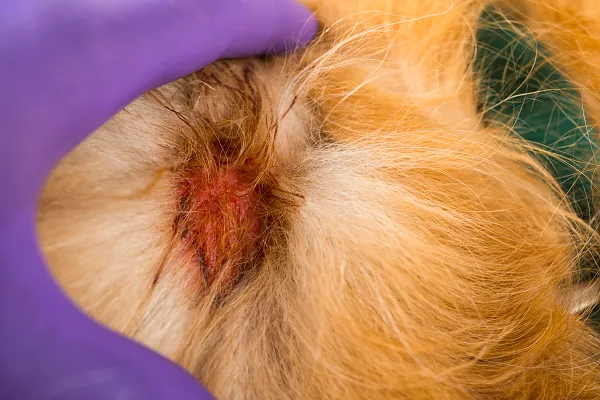Lungworm Infections in Dogs

There are many species of lungworm that can cause respiratory problems in dogs. Infection is acquired through either: ingestion of an intermediate host such as snails or slugs, ingestion of animals that have been infected by eating these animals or depending on the species, from an infected dog by contact with saliva, nasal discharge, or contaminated food and water bowls. Lungworms can be found throughout North America and the world with certain species seen in certain areas. Clincal signs can range from asymptomatic to tachypnea, coughing, sneezing, wheezing, respiratory distress or exercise intolerance. The degree of clinical signs is usually proportional to the strength of the dog’s immune system. Diagnosis involves history, physical exam, x-rays and organism identification through either baermann fecal examination or BAL/bronchoscopy. Treatment involves use of specific antiparasitic drugs for various lengths of time depending on type and severity of infection. Prognosis is good but re-infection can occur.
Lung Fluke Infections in Dogs

Lung flukes in North America are parasites called Paragonimus kellicotti that infect the lungs of dogs after they have eaten an infected crayfish or rodents that have eaten infected crayfish. Eggs are then released by the parasite into the dog’s sputum to be coughed out or swallowed and released in the feces to continue the life cycle. Lung flukes can be found anywhere in North America but more commonly around the Mississippi River and Great Lakes. Infected dogs can be symptom-free or may develop cough with sometimes bloody mucus, pneumonia, pneumothorax, lethargy and weakness. Diagnosis can include locating eggs of the parasite from feces or mucus from the lungs. X-rays can also reveal cysts in the lungs caused by the parasite. Treatment requires one of 2 commonly used anti-parasitic medications: Praziquantel or Fenbendazole. Although zoonotic, these parasites won’t transmit directly from dogs to humans.
Ivermectin + Pyrantel + Praziquantel

Ivermectin + pyrantel + praziquantel is a combination of anti-parasitic medications used to prevent heartworms and control roundworm, hookworm, and tapeworm in dogs. It is given by mouth as a flavored chew tablet. At prescribed doses, this product is generally well-tolerated but some dogs may experience decreased appetite, vomiting, diarrhea, or burping. Certain drugs may interact with those in this combination product; it is extremely important to let your veterinarian know about any medications or supplements that your pet is taking. If your dog has an adverse reaction to this product, call your veterinary office immediately.
Ivermectin + Pyrantel

Ivermectin + pyrantel is a heartworm disease preventive that treats and controls hookworms and roundworms in dogs. Ivermectin + pyrantel is given by mouth as a flavored chew tablet. At prescribed doses, ivermectin + pyrantel is well-tolerated. Some dog breeds (e.g., collies, sheepdogs, and collie- or sheepdog-cross breeds) are more sensitive to ivermectin than others; your veterinarian will advise you on the safety of using this medication in your dog. If you suspect an overdose or an adverse reaction to the medication, call your veterinary office immediately.
Imidocarb Dipropionate

Imidocarb dipropionate is an injectable medication that is administered by a veterinarian to treat babesiosis in dogs. It is also used off-label to treat other protozoal infections in dogs, cats, and horses. Most common side effects include mild drooling, tearing, vomiting, or nasal drip. Do not use in pets with exposure to cholinesterase-inhibiting drugs, pesticides, or chemicals. If a negative reaction occurs, please call your veterinary office.
Hot Spots in Dogs

Canine hot spots are red, inflamed skin lesions that appear quickly, ooze, and may contain pus. They are the result of a dog excessively scratching, licking, or chewing at an itch. There are several possible underlying causes of the itch and it is crucial to determine what it is to successfully treat the problem. This handout explains these possible causes and the treatment(s) required to resolve them.
Hepatozoonosis in Dogs

Hepatozoonosis in dogs is caused by ingestion of one of two organisms: H. americanum and H. canis. Both parasites are more common in the southern United States. The clinical sign and treatments for dogs with hepatozoonosis differ depending on the parasite species causing the infection. In either case, with appropriate treatment, the prognosis is generally good.
Xylitol Poisoning in Dogs

Xylitol is a naturally occurring substance that is widely used as a sugar substitute. Chemically, it is a sugar alcohol, and found naturally in berries, plums, corn, oats, mushrooms, lettuce, trees, and some other fruits. Xylitol is extremely toxic to dogs. Even small amounts of xylitol can cause hypoglycemia (low blood sugar), seizures, liver failure, or even death in dogs.
Why Does My Veterinarian Charge So Much?

Running a veterinary clinic has a lot of overhead and behind the scenes cost that many pet owners aren’t aware of. Human healthcare is far more expensive and less efficient than you realize. Plan ahead and take preventive steps to help reduce treating costly problems.
Vitamin D Poisoning in Dogs

Vitamin D poisoning occurs when a dog ingests a toxic dose of vitamin D. A common source of vitamin D poisoning is when a dog accidentally ingests rodenticides containing vitamin D. Another source of vitamin D poisoning is the accidental ingestion of certain human medications.
